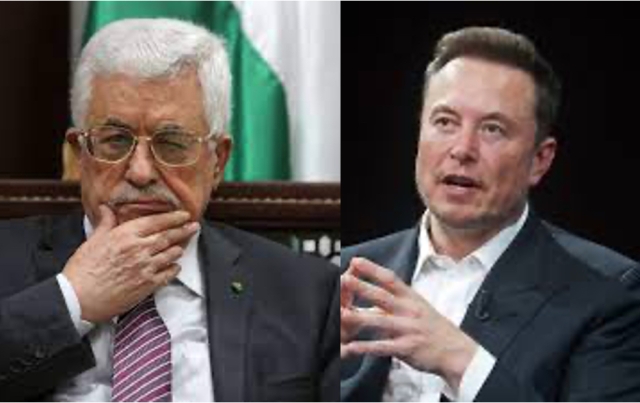At a time when tech entrepreneur Elon Musk is facing scrutiny for a bitter dispute with the Anti-Defamation League (ADL), another public figure—Palestinian President Mahmoud Abbas—is on record displaying overt antisemitism. This disparity in public condemnation and media focus raises significant questions, particularly considering that Abbas is the leader whom the global community has pressured Israel, which is the only Jewish State, to negotiate with for peace.
The Elon Musk and ADL Controversy
Elon Musk has recently attracted public ire for accusing the ADL, led by Jonathan Greenblatt—a former advisor to President Barack Obama—of initiating an advertising boycott against the social media platform 'X' (formerly Twitter). This move came weeks after Musk took over Twitter and has purportedly resulted in a nearly 60% drop in advertising revenue. While criticisms may abound, it's crucial to note that the accusations against Musk are centered on corporate and advertising disagreements, not on any form of documented antisemitic speech. Despite this fact, the media coverage of Musk and his assertions have been getting far more negative media coverage, painting the tech mogul as an antisemite who is using a time old trope about how Jews control the minute workings of everyday business.
The @ADL today is nothing what it used to be. Since Abe Foxman retired it has been run by an attention seeking political opportunist who uses ADL’s name and money to increase the size of his own social media reach.
— Jay Engelmayer (@jengelmayer) September 6, 2023
Everything he does is based on keeping him, and the ADL in…
Mahmoud Abbas's Troubling Statements
Contrastingly, Mahmoud Abbas has been caught on tape actually making remarks that are steeped in historical distortion and antisemitism during a recent Fatah party's Revolutionary Council meeting. Abbas erroneously suggested that Adolf Hitler's war against Jews was rooted not in antisemitism but in their alleged roles as "money lenders."
To add further insult, Abbas also claimed that American Jews are forced into immigrating to Israel against their will, perpetuating a narrative that has long been a cornerstone of antisemitic rhetoric. So why is Musk under fire in the American media while Abbas's remarks go largely unreported?
Palestinian Authority President Mahmoud Abbas: Hitler Fought the European Jews Because of Their Usury, Money Dealings, It Was Not about Antisemitism.
— Israel Foreign Ministry (@IsraelMFA) September 6, 2023
This is the same Mahmoud Abbas whose doctoral dissertation is known for its Holocaust denial.pic.twitter.com/9wKupMhMB2
Public Outrage and Response
Abbas's comments have elicited widespread condemnation, but mostly from within Israel. Yad Vashem, Israel's memorial for Holocaust victims, labeled his speech as the "worst form of Holocaust denialism ever expressed by a leader." Concerns were also raised about the dangerous complacency shown by the meeting's attendees, who did not challenge Abbas's inflammatory remarks.
Similarly, Israel's Ambassador to Germany, Ron Posor, called for stringent actions against the Palestinian leader for inciting hatred. Posor indicated that this incitement begins with antisemitic educational materials and can escalate into genocide.
Meanwhile, the international media and leaders who have helped to prop up Abbas over the nearly two decades of his autocratic reign have remained silent. Instead, Elon Musk is under the microscope and allegations of his antisemitism have been broadcast and discussed in nearly every major news forum from cable news to the editorials of major publications. The contrast is stark, Musk is being accused of something that Abbas is on record as having said, and yet Abbas is ignored while the pundits seemingly go out of their way to insinuate that Musk is the Jew hating villain.
Inconsistent Positions
In the past, Abbas has sent mixed signals, pledging to recognize the horrors of the Holocaust and even sending Palestinian officials to Holocaust memorials. This flip-flopping adds a layer of complexity to Abbas's current stance, making his antisemitic comments even more puzzling and unacceptable. Meanwhile, Musk has not expressed antisemitic thoughts or feelings before, in fact many of his advisors and executive leadership in the companies he has built and run are Jewish. His remarks directed at the ADL are specific to an action that the ADL is on record as having done, and his assertion about the loss of revenue can be tied to that action.
Israeli Officials Weigh In On Abbas
Israel's UN envoy, Gilad Erdan, in a social media post, highlighted that Abbas's actions reflect the deeply rooted antisemitism within the Palestinian leadership. Erdan emphasized that the international community should hold Abbas and his regime accountable for such incitement and the violence it begets.
Nearly two years ago the UN adopted a resolution I initiated to combat Holocaust denial and distortion. Yet shamefully, in two weeks, President Abbas, a man who publicly blames the Jews for the Holocaust - the ultimate form of Holocaust denial - will take the stage in the very… pic.twitter.com/pbxdK2h9YL
— Ambassador Gilad Erdan גלעד ארדן (@giladerdan1) September 6, 2023
Conclusions: A Tale of Two Criticisms
While Elon Musk's skirmish with the ADL involves advertising revenue and corporate disagreements, Mahmoud Abbas's recorded comments are indisputably antisemitic and highly damaging. Despite this, the world continues to push Israel to make challenging concessions to Abbas in the pursuit of peace.
Jonathan at ADL kicked off a massive Twitter boycott campaign less than a week after the acquisition closed.
— Elon Musk (@elonmusk) September 6, 2023
Literally nothing had changed about the site.
Our US revenue is still 60% down from that campaign, but slowly improving. pic.twitter.com/7vh5dtdDqi
The disparity in public and international response to these two cases underscores the imperative for a more nuanced and equitable approach to allegations of antisemitism. Above all, it is crucial to differentiate between corporate squabbles and actual, dangerous hate speech that undermines the quest for understanding and peace in the Middle East.
The recent events underscore the ongoing struggle against disinformation and deeply ingrained prejudices. A balanced and fair perspective is vital in the battle against hatred and antisemitism.


